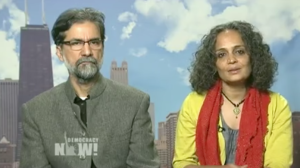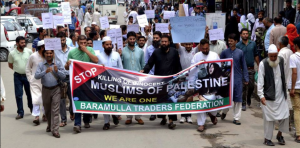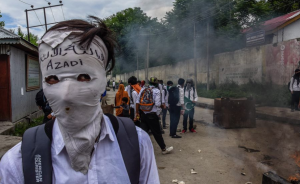Nationalist vituperations about the attack on Hindu pilgrims, which Kashmiri activists had nothing to do with, has raised the old canard about the exodus of Hindu Pandits from Kashmir. As I learned the hard way, the available sources all portray a nationalist view of that exodus as an ethnic cleansing of Kashmiri Hindus by Kashmiri Muslims. This interview with Sanjay Kak by David Barsamian, both supporters of Kashmiri self-determination, is worth reposting so that historic lies do not become accepted as historic facts. Kashmiris I have asked consider this a cogent elaboration of the exodus of Pandits from Kashmir.
*********
Sanjay Kak on why the Kashmiri Pandits left the valley. (An interview by David Barsamian, January 2014)
David Barsamian: “One of the themes reiterated by those who support continued “occupation” of Kashmir by Indian security forces is the plight of the Kashmiri Pandits, the Kashmiri Hindu Brahmins. These people say they were forced out, brutalized, and they lost everything. You are a Kashmiri Pandit and your family is from Kashmir originally. What credence do you give to those kinds of reports?”
Sanjay Kak: “That’s a fact. The years 1989, 1990, and 1991 were very chaotic in Kashmir. There was a sudden and almost unplanned armed insurrection. There was an immediate and brutal crackdown and conditions were terrible. There was chaos in the air. In that situation, the Kashmiri Pandits, who were only 2 percent of the population, found themselves extremely vulnerable, despite the fact that there was a long history, if not of great cordiality, but certainly of mutual respect between the Muslim majority and the Hindu Brahmin minority.
But I think what we don’t recognize is that in that chaos there were all kinds of forces who would use that community in order to achieve other ends. We’re talking about, say, a population of probably not more than 150,000 people. And it is true that in 1990 and 1991, about 200 people from this small community were killed. Of course, it’s also true that in that same period probably 8,000 Kashmiri Muslims were killed. But we’re not doing math here, we’re not doing an equation of how many more people died because it’s true that even in a minority of 150,000, if 200 get killed, it is going to panic those people.
But the question is, who did those killings? It’s not Kashmiri Muslims who killed them. It’s important to identify and bring to book people responsible for the killings, whether they were Hindus or Muslims is not relevant. But in a time like that, in this completely chaotic, turbulent early 1990s, it’s very difficult to say who wanted to precipitate a crisis. Because if I were an extremist fringe militant organization, I might want to attack Kashmiri Pandits in order to precipitate a certain polarization between the communities. It could be argued that from the Indian state’s point of view also, the targeting of the Kashmiri Pandits served a useful purpose because it allowed the Indian state to paint the movement there, which saw itself as a movement for the liberation of Kashmir, as a fundamentalist Islamic movement. And as we discussed, there is also criminality. So if there were three families in a remote village and somebody had an eye on their land, in those prevailing chaotic circumstances, it would be possible to target those people and benefit from it.
Where I stand, apart from the general discourse on the position of the Kashmiri Pandits, is that I do not believe that this makes Kashmiri Muslims as a community or as a people culpable for those few crimes. That’s something in my work I’ve always tried to avoid. The troubles in Kashmir have not been communal in nature. That’s the word that we in India use for the tension between Hindus and Muslims. We use a polite term for it. “Communal tensions” they are called. There is no denying the fact that Kashmiri Pandits were in severe danger in Kashmir in the early 1990s. There is no doubt they were targeted and killed. And in the resultant chaos there was an exodus of this minority over the space of a few years left Kashmir.
It must also be at the same time that however tragic this was, the state made no attempt to stop that exodus. In the early 1990s, India was being riven with this new right-wing Hindu mobilization. And so the Kashmiri Pandit minority who left Kashmir at a time like that fell straight into the hands of the Hindutva right wing. That was the real tragedy, that what was a chaotic situation, which was local to Kashmir and could perhaps have been resolved in other ways. Suddenly, it became an issue around which Hindu mobilization in India was being constructed and Kashmir became an integral part of that.
Were Kashmiri Pandits forced to leave Kashmir? Yes, circumstances did force them. Were they victims? Of course they were. But they were victims in the same way that Kashmiri Muslims were victims. If we were to take a count of the migration during the 1990s from the Kashmir Valley, I can tell you more Kashmiri Muslims left for various reasons. But because they are Muslims, it’s not seen in the same way. One of the great tragedies of what has happened in Kashmir in the 1990s is that the distinctions between Kashmiri Muslims and Kashmiri Hindus suddenly were cast in concrete. As I said before, it’s not exactly as if the two communities were absorbed in each other. They were separate and distinct, but they had found a way of surviving for centuries. It could have retained that quality, but it didn’t.”‘


